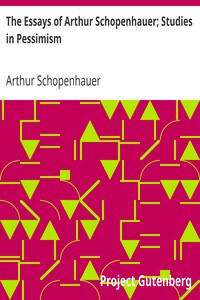Downloads & Free Reading Options - Results
Suffering%2c Suicide%2c And Immortality by Arthur Schopenhauer
Read "Suffering%2c Suicide%2c And Immortality" by Arthur Schopenhauer through these free online access and download options.
Books Results
Source: The Internet Archive
The internet Archive Search Results
Available books for downloads and borrow from The internet Archive
1Suffering, Suicide, And Immortality : Eight Essays From The Parerga
By Schopenhauer, Arthur, 1788-1860
“Suffering, Suicide, And Immortality : Eight Essays From The Parerga” Metadata:
- Title: ➤ Suffering, Suicide, And Immortality : Eight Essays From The Parerga
- Author: ➤ Schopenhauer, Arthur, 1788-1860
- Language: English
“Suffering, Suicide, And Immortality : Eight Essays From The Parerga” Subjects and Themes:
- Subjects: Pessimism - Pessimisme
Edition Identifiers:
- Internet Archive ID: sufferingsuicide0000scho
Downloads Information:
The book is available for download in "texts" format, the size of the file-s is: 325.68 Mbs, the file-s for this book were downloaded 209 times, the file-s went public at Sun Nov 20 2022.
Available formats:
ACS Encrypted PDF - Cloth Cover Detection Log - DjVuTXT - Djvu XML - Dublin Core - EPUB - Item Tile - JPEG Thumb - JSON - LCP Encrypted EPUB - LCP Encrypted PDF - Log - MARC - MARC Binary - Metadata - OCR Page Index - OCR Search Text - PNG - Page Numbers JSON - RePublisher Final Processing Log - RePublisher Initial Processing Log - Scandata - Single Page Original JP2 Tar - Single Page Processed JP2 ZIP - Text PDF - Title Page Detection Log - chOCR - hOCR -
Related Links:
- Whefi.com: Download
- Whefi.com: Review - Coverage
- Internet Archive: Details
- Internet Archive Link: Downloads
Online Marketplaces
Find Suffering, Suicide, And Immortality : Eight Essays From The Parerga at online marketplaces:
- Amazon: Audiable, Kindle and printed editions.
- Ebay: New & used books.
Source: LibriVox
LibriVox Search Results
Available audio books for downloads from LibriVox
1Über die Weiber
By Arthur Schopenhauer

In diesem vielzitierten Essay aus dem Jahre 1851 ist Schopenhauers generell herablassende Einstellung zu Frauen zusammengefaßt. Frauen, laut Schopenhauer, sind Wesen zweiter Klasse mit weniger Vernunft als Maenner, und sind biologisch zur List und Intrige getrieben... Schopenhauers dominante Mutter Johanna, eine bekannte Schriftstellerin, wird oft als Ursache für die Frauenfeindlichkeit ihres Sohns genannt.<br> (Zusammenfassung von Gesine)
“Über die Weiber” Metadata:
- Title: Über die Weiber
- Author: Arthur Schopenhauer
- Language: German - Deutsch
- Publish Date: 1851
Edition Specifications:
- Format: Audio
- Number of Sections: 1
- Total Time: 00:11:07
Edition Identifiers:
- libriVox ID: 454
Links and information:
- LibriVox Link: LibriVox
- Text Source: Projekt-gutenberg - Download text file/s.
- Number of Sections: 1 section
Online Access
Download the Audio Book:
- File Name: ueber_die_weiber_librivox
- File Format: zip
- Total Time: 00:11:07
- Download Link: Download link
Online Marketplaces
Find Über die Weiber at online marketplaces:
- Amazon: Audiable, Kindle and printed editions.
- Ebay: New & used books.
2Reise durch England und Schottland
By Johanna Schopenhauer

1819 gerät das Handelshaus, bei dem Johanna Schopenhauer ihr ganzes Geld angelegt hat, in Zahlungsschwierigkeiten. Beim anschließenden Vergleich verliert sie 70% ihres Vermögens. Ihr Sohn Arthur (der Philosoph), der sich vorher den Anteil am väterlichen Erbe auszahlen ließ, verweigert die Unterstützung. Sie muss sich jetzt selbst um ihre Einkünfte sorgen. Lange Reisen wie die nach England sind ihr nicht mehr möglich. Ihre Schriftstellerei wird zu einer wichtigen Einkommensquelle. Sie veröffentlicht Reiseerzählungen, Romane und Novellen. (Zusammenfassung aus Wikipedia)
“Reise durch England und Schottland” Metadata:
- Title: ➤ Reise durch England und Schottland
- Author: Johanna Schopenhauer
- Language: German - Deutsch
- Publish Date: 1818
Edition Specifications:
- Format: Audio
- Number of Sections: 75
- Total Time: 10:46:31
Edition Identifiers:
- libriVox ID: 719
Links and information:
Online Access
Download the Audio Book:
- File Name: reise_d_england_0810_librivox
- File Format: zip
- Total Time: 10:46:31
- Download Link: Download link
Online Marketplaces
Find Reise durch England und Schottland at online marketplaces:
- Amazon: Audiable, Kindle and printed editions.
- Ebay: New & used books.
3Studies in Pessimism
By Arthur Schopenhauer

Arthur Schopenhauer, an early 19th century philosopher, made significant contributions to metaphysics, ethics, and aesthetics. His work also informed theories of evolution and psychology, largely through his theory of the will to power – a concept which Nietzsche famously adopted and developed. Despite this, he is today, as he was during his life, overshadowed by his contemporary, Hegel. Schopenhauer's social/psychological views, put forth in this work and in others, are directly derived from his metaphysics, which was strongly influenced by Eastern thought. His pessimism forms an interesting and perhaps questionable contrast with his obvious joy in self-expression, both in the elegance of his prose and in his practice of playing the flute nightly.<br /><br /> His brilliance, poetry, and crushing pessimism can be seen immediately in this work, as for example in this claim from the first chapter: "The pleasure in this world, it has been said, outweighs the pain; or, at any rate, there is an even balance between the two. If the reader wishes to see shortly whether this statement is true, let him compare the respective feelings of two animals, one of which is engaged in eating the other." We see also, in this work, his misogyny, as for example in his claim that "as lions are provided with claws and teeth, and elephants and boars with tusks, . . . so Nature has equipped woman, for her defence and protection, with the arts of dissimulation; and all the power which Nature has conferred upon man in the shape of physical strength and reason, has been bestowed upon women in this form." Given his opening comment, the translator, T.B. Saunders, seems to have been at least somewhat sympathetic to this perspective. - Summary by D.E. Wittkower
“Studies in Pessimism” Metadata:
- Title: Studies in Pessimism
- Author: Arthur Schopenhauer
- Language: English
- Publish Date: 1893
Edition Specifications:
- Format: Audio
- Number of Sections: 10
- Total Time: 3:25:46
Edition Identifiers:
- libriVox ID: 779
Links and information:
Online Access
Download the Audio Book:
- File Name: studies_pessimism_librivox
- File Format: zip
- Total Time: 3:25:46
- Download Link: Download link
Online Marketplaces
Find Studies in Pessimism at online marketplaces:
- Amazon: Audiable, Kindle and printed editions.
- Ebay: New & used books.
4Art of Controversy (or: The Art of Being Right)
By Arthur Schopenhauer
<em>The Art of Controversy</em> (or <em>The Art of Being Right</em>) (<em>Die Kunst, Recht zu Behalten</em>) is a short treatise written in 1831 by the German philosopher Arthur Schopenhauer in which he presents thirty-eight methods of gaining an unfair advantage in a debate and thereby being right even if you are wrong. Schopenhauer champions the virtue of dialectical argument, in his view wrongly neglected by philosophers in favour of logic, and goes on to discuss the distinction between our conscious intellectual powers and our will. The text is a favourite of debaters including the philosophers AC Grayling and Mary Warnock, and the Mayor of London Boris Johnson. (Summary by Carl Manchester)
“Art of Controversy (or: The Art of Being Right)” Metadata:
- Title: ➤ Art of Controversy (or: The Art of Being Right)
- Author: Arthur Schopenhauer
- Language: English
- Publish Date: 1896
Edition Specifications:
- Format: Audio
- Number of Sections: 10
- Total Time: 3:13:31
Edition Identifiers:
- libriVox ID: 3384
Links and information:
Online Access
Download the Audio Book:
- File Name: controversy_1011_librivox
- File Format: zip
- Total Time: 3:13:31
- Download Link: Download link
Online Marketplaces
Find Art of Controversy (or: The Art of Being Right) at online marketplaces:
- Amazon: Audiable, Kindle and printed editions.
- Ebay: New & used books.
5World as Will and Idea Volume 1
By Arthur Schopenhauer

Schopenhauer used the word "will" as a human's most familiar designation for the concept that can also be signified by other words such as "desire," "striving," "wanting," "effort," and "urging." Schopenhauer's philosophy holds that all nature, including man, is the expression of an insatiable will to life. It is through the will that mankind finds all their suffering. Desire for more is what causes this suffering. He used the word representation (Vorstellung) to signify the mental idea or image of any object that is experienced as being external to the mind. It is sometimes translated as idea or presentation. This concept includes the representation of the observing subject's own body. Schopenhauer called the subject's own body the immediate object because it is in the closest proximity to the mind, which is located in the brain. (Summary by Wikipedia)
“World as Will and Idea Volume 1” Metadata:
- Title: ➤ World as Will and Idea Volume 1
- Author: Arthur Schopenhauer
- Language: English
- Publish Date: 1818
Edition Specifications:
- Format: Audio
- Number of Sections: 45
- Total Time: 22:41:00
Edition Identifiers:
- libriVox ID: 6655
Links and information:
Online Access
Download the Audio Book:
- File Name: world_will_idea_1301_librivox
- File Format: zip
- Total Time: 22:41:00
- Download Link: Download link
Online Marketplaces
Find World as Will and Idea Volume 1 at online marketplaces:
- Amazon: Audiable, Kindle and printed editions.
- Ebay: New & used books.
6World As Will and Idea, Vol. 1 of 3
By Arthur Schopenhauer

In this work, Schopenhauer explains his fundamental idea that at the root of the reality we see around us is a Will that eternally, insatiably seeks to be satisfied. Each human Subject observes the Objects around her from the perspective of that fundamental Will working within each person. The human observer is distracted by the details of life and individual distinctions that obscure this Will; only by penetrating this “principium individuationis” (which is enslaved by the cause-and-effect tyranny of the Principle of Sufficient Reason) can the observer perceive the essential Thing-In-Itself. Art has the power to make us see the Thing-In-Itself, the Platonic Idea freed from the individual particular manifestation of it, thus enabling us to transcend the individual Will and perceive something of true Reality. Perceiving the common Will in all humanity, we are able to come closer to an ego-less love based on that shared essence. Schopenhauer squarely faces the fact that existence is fundamentally suffering, but it would be simplistic to label him (as is so often done) as nothing but a pessimist. His affirmation of Art and Love is a transforming principle, having a powerful influence on writers such as Tolstoy. In the end, he chooses the Way of Negation as the path toward peace; by denying our Will, by silencing the many outbreaks of Will in our lives, we can approach the ultimate peace of annihilation that is the theme of the great Vedic philosophy of India, to which Schopenhauer admits his profound debt. ( summary by Expatriate)
“World As Will and Idea, Vol. 1 of 3” Metadata:
- Title: ➤ World As Will and Idea, Vol. 1 of 3
- Author: Arthur Schopenhauer
- Language: English
- Publish Date: 1909
Edition Specifications:
- Format: Audio
- Number of Sections: 78
- Total Time: 21:01:47
Edition Identifiers:
- libriVox ID: 9711
Links and information:
Online Access
Download the Audio Book:
- File Name: worldaswillandidea_v1_1505_librivox
- File Format: zip
- Total Time: 21:01:47
- Download Link: Download link
Online Marketplaces
Find World As Will and Idea, Vol. 1 of 3 at online marketplaces:
- Amazon: Audiable, Kindle and printed editions.
- Ebay: New & used books.
7World as Will and Idea, Vol. 2 of 3
By Arthur Schopenhauer

In this work, Schopenhauer explains his fundamental idea that at the root of the reality we see around us is a Will that eternally, insatiably seeks to be satisfied. Each human Subject observes the Objects around her from the perspective of that fundamental Will working within each person. The human observer is distracted by the details of life and individual distinctions that obscure this Will; only by penetrating this “principium individuationis” (which is enslaved by the cause-and-effect tyranny of the Principle of Sufficient Reason) can the observer perceive the essential Thing-In-Itself. Art has the power to make us see the Thing-In-Itself, the Platonic Idea freed from the individual particular manifestation of it, thus enabling us to transcend the individual Will and perceive something of true Reality. Perceiving the common Will in all humanity, we are able to come closer to an ego-less love based on that shared essence. Schopenhauer squarely faces the fact that existence is fundamentally suffering, but it would be simplistic to label him (as is so often done) as nothing but a pessimist. His affirmation of Art and Love is a transforming principle, having a powerful influence on writers such as Tolstoy. In the end, he chooses the Way of Negation as the path toward peace; by denying our Will, by silencing the many outbreaks of Will in our lives, we can approach the ultimate peace of annihilation that is the theme of the great Vedic philosophy of India, to which Schopenhauer admits his profound debt. ( Expatriate)
“World as Will and Idea, Vol. 2 of 3” Metadata:
- Title: ➤ World as Will and Idea, Vol. 2 of 3
- Author: Arthur Schopenhauer
- Language: English
- Publish Date: 1909
Edition Specifications:
- Format: Audio
- Number of Sections: 65
- Total Time: 18:52:53
Edition Identifiers:
- libriVox ID: 9926
Links and information:
Online Access
Download the Audio Book:
- File Name: world_will_idea_v2_1507_librivox
- File Format: zip
- Total Time: 18:52:53
- Download Link: Download link
Online Marketplaces
Find World as Will and Idea, Vol. 2 of 3 at online marketplaces:
- Amazon: Audiable, Kindle and printed editions.
- Ebay: New & used books.
8World as Will and Idea, Vol. 3 of 3
By Arthur Schopenhauer

In this work, Schopenhauer explains his fundamental idea that at the root of the reality we see around us is a Will that eternally, insatiably seeks to be satisfied. Each human Subject observes the Objects around her from the perspective of that fundamental Will working within each person. The human observer is distracted by the details of life and individual distinctions that obscure this Will; only by penetrating this “principium individuationis” (which is enslaved by the cause-and-effect tyranny of the Principle of Sufficient Reason) can the observer perceive the essential Thing-In-Itself. Art has the power to make us see the Thing-In-Itself, the Platonic Idea freed from the individual particular manifestation of it, thus enabling us to transcend the individual Will and perceive something of true Reality. Perceiving the common Will in all humanity, we are able to come closer to an ego-less love based on that shared essence. Schopenhauer squarely faces the fact that existence is fundamentally suffering, but it would be simplistic to label him (as is so often done) as nothing but a pessimist. His affirmation of Art and Love is a transforming principle, having a powerful influence on writers such as Tolstoy. In the end, he chooses the Way of Negation as the path toward peace; by denying our Will, by silencing the many outbreaks of Will in our lives, we can approach the ultimate peace of annihilation that is the theme of the great Vedic philosophy of India, to which Schopenhauer admits his profound debt. - Summary by Expatriate
“World as Will and Idea, Vol. 3 of 3” Metadata:
- Title: ➤ World as Will and Idea, Vol. 3 of 3
- Author: Arthur Schopenhauer
- Language: English
- Publish Date: 1909
Edition Specifications:
- Format: Audio
- Number of Sections: 54
- Total Time: 18:00:57
Edition Identifiers:
- libriVox ID: 10106
Links and information:
Online Access
Download the Audio Book:
- File Name: world_will_idea_v3_1511_librivox
- File Format: zip
- Total Time: 18:00:57
- Download Link: Download link
Online Marketplaces
Find World as Will and Idea, Vol. 3 of 3 at online marketplaces:
- Amazon: Audiable, Kindle and printed editions.
- Ebay: New & used books.
9Essays of Schopenhauer
By Arthur Schopenhauer

Schopenhauer is considered to be one of the most influential philosophers of all times. Many of his ideas and quotes have been quoted largely and have now become almost commonplace. The essays in this collection are a proof of his breakthrough contributions to Reason, Logic, Progress and Linguistics.
“Essays of Schopenhauer” Metadata:
- Title: Essays of Schopenhauer
- Author: Arthur Schopenhauer
- Language: English
- Publish Date: 1892
Edition Specifications:
- Format: Audio
- Number of Sections: 24
- Total Time: 08:13:09
Edition Identifiers:
- libriVox ID: 15615
Links and information:
Online Access
Download the Audio Book:
- File Name: essays_of_schopenhauer_2107_librivox
- File Format: zip
- Total Time: 08:13:09
- Download Link: Download link
Online Marketplaces
Find Essays of Schopenhauer at online marketplaces:
- Amazon: Audiable, Kindle and printed editions.
- Ebay: New & used books.
10Basis Of Morality
By Arthur Schopenhauer

In 1837, the Danish Royal Society of Sciences offered a prize to any essayist who could satisfactorily answer the question, "Is the fountain and basis of Morals to be sought for in an idea of morality which lies directly in the consciousness (or conscience), and in the analysis of the other leading ethical conceptions which arise from it? Or is it to be found in some other source of knowledge?" The Basis of Morality is the essay submitted in 1840 by German philosopher Arthur Schopenhauer. In it, he first mercilessly deconstructs the prevailing Western theory of morality as championed by Immanuel Kant, among others, before establishing a series of maxims and thought experiments which lead him to a conclusion which points squarely at compassion as the cardinal virtue upon which all morality rests. In the appendix to this essay, he links his own conclusion with the conclusions reached millennia earlier by the authors of the Vedas and Upanishads. The essay was ultimately rejected for the prize despite being the only entry, a minor scandal with some speculation that the result was due in no small part to Schopenhauer's onslaught against Hegel—the judge of the contest being the author of a Hegelian theory of morals. (Summary by Jeffrey Allen Stumpf)
“Basis Of Morality” Metadata:
- Title: Basis Of Morality
- Author: Arthur Schopenhauer
- Language: English
- Publish Date: 1903
Edition Specifications:
- Format: Audio
- Number of Sections: 13
- Total Time: 07:19:04
Edition Identifiers:
- libriVox ID: 17835
Links and information:
Online Access
Download the Audio Book:
- File Name: the_basis_of_morality_2207_librivox
- File Format: zip
- Total Time: 07:19:04
- Download Link: Download link
Online Marketplaces
Find Basis Of Morality at online marketplaces:
- Amazon: Audiable, Kindle and printed editions.
- Ebay: New & used books.
Buy “Suffering%2c Suicide%2c And Immortality” online:
Shop for “Suffering%2c Suicide%2c And Immortality” on popular online marketplaces.
- Ebay: New and used books.